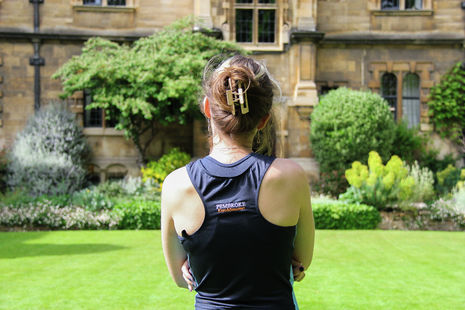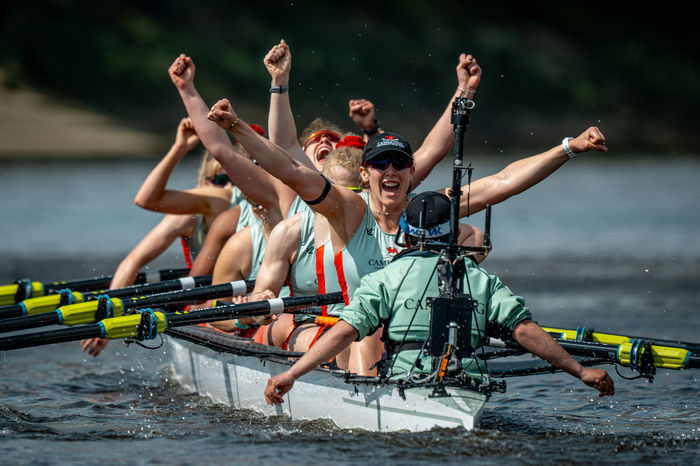Reflections on rowing
Join India as she investigates the world of Cambridge rowing firsthand

Last term, one of my friends steadily slipped away from the dazzling scenes of Cambridge nightlife. Once a fixture in Revs’ smoking area, she now barely graced the doorway of The Regal. I put this down to her new boyfriend and busy Natsci schedule, but alas, I had forgotten the most consuming relationship of all and the true cause of her absence: rowing.
I have never looked kindly on the Cambridge rowing scene. To me, anyone who claims that they enjoy rowing is suffering from a severe case of Stockholm syndrome, hostage to the punishing hours on the ‘hard erg’. But perhaps I have judged too quickly. Despite my disdain, I have little knowledge about what the life of a rower entails (FYI, that is not an open invitation for someone to mansplain bumps for the 700th time). In order to overcome my intolerance, I decided to take the plunge and embarked on a day in the life of a rower.
It didn’t take long for regret to sink in; my new 5:30am alarm sat uncomfortably with my usual night owl routine. Yet, as I cycled groggily down an empty King’s Parade, pursuing the trickle of rowers to the Cam, I felt a surprising emotion grow with the tick of each pedal. A sense of superiority sank in, and I began to see the cause for the early rise. For the first time in exam term, I felt ahead of the game.
“Perhaps the rowers were a more self aware bunch than I thought”
As we pulled up to the Pembroke boathouse, my hesitant enjoyment grew by the minute. A mixed group of undergrads and postgrads smiled and welcomed me in. Looking up at the cards of encouragement and team photos lining the walls, I began to understand the pull of the Cam. There was a generational sense of camaraderie and a prestige in the pictures of rowers stretching back almost a century which spoke for itself. I was still sufficiently lazy and firm in my anti-rowing position to not get on the boat (a decision admittedly for the benefit of all involved). Instead, whilst the crew jauntily launched off, I ventured further into their world. Stumbling across a poster of the ‘rules of rowing’ confirmed my suspicions: “you row because you like pain”. Perhaps the rowers were a more self aware bunch than I thought.
Propped up on my three hours of sleep, I dragged myself back to college, where I promptly discovered my next targets in the buttery. The bright lights of the green QERGS t-shirts led the way, and I easily zoned in on a pack of Queens’ rowers. With the conversation already on rowing (stereotype confirmed), it was easy to segue into interrogation. One W2 rower emphasised the culture of friendship: a sense of common ground which translates beyond your crew to the wider community. As she explained, complaints over early starts and muscle soreness foster conversation with strangers more easily than the stilted questions of subject and college. As they reminisced on shared nights out, the rowers once again began to win my affection, and their laughter counteracted my scepticism. But it wasn’t all sunshine and rainbows. One M3 rower expressed disdain for a sport-wide “culture of judgement”. In a world where erg scores are public, and constant measuring fosters comparison, it is easy to see how a toxic kind of competition could emerge.
“There is a certain hypocrisy with which I critique ‘the rowers’ as a homogenous group”
As my day of rowing wore on, I began to come to a radical conclusion: all rowers are not made equal. My preconception of ‘the rower’ as a copy-paste villain, sweatily pursuing you to share their 2km time was fading, as the differing commitments of divisions and colleges became clear.
After all, there is a certain hypocrisy with which I critique ‘the rowers’ as a homogenous group. If rowing is a cult, it is a more inviting one than most. The intense drive of the Cambridge workload and wider hustle culture often fosters a kind of atomisation, in which insular groups form. The ‘culture of judgement’ which rowing has the potential to create is hardly an unfamiliar concept to any Cambridge student, regardless of their hobbies. Does anything really mark rowers as worse than ‘Union hacks’, Mathmos, or (dare I say it) avid Varsity writers? If anything, they are notably enthusiastic and welcoming, and perhaps my dismissal came from a place of jealousy for their drive.
Will I be taking up the oar? It’s unlikely: my sleep schedule and general laziness would likely prevent any long-term lifestyle commitment. But I now view rowing culture with fresh eyes. Whilst competitive sport always threatens an edge of toxicity, the overwhelming feelings the boat club exudes are those of community and enthusiasm – and in an increasingly polarised and sometimes gloomy world, it’s hard to condemn unity.
That being said, my position as a fly on the boathouse wall had gone far enough, and I eagerly moved onto new, dryer pastures. Until the somewhat invasive fever of Bumps hit, my brief stint in rowing led me to a place of peaceful coexistence, a live and let row attitude. After all, its popularity shows no signs of stalling, and my reconciliation with its many devotees is likely for the best.
 News / Colleges charge different rents for the same Castle Street accommodation2 March 2026
News / Colleges charge different rents for the same Castle Street accommodation2 March 2026 News / News in Brief: waterworks, wine woes, and workplace wins 1 March 2026
News / News in Brief: waterworks, wine woes, and workplace wins 1 March 2026 News / Angela Merkel among Cambridge honorary degree nominees27 February 2026
News / Angela Merkel among Cambridge honorary degree nominees27 February 2026 News / Climate activists protest for ‘ethical careers policy’1 March 2026
News / Climate activists protest for ‘ethical careers policy’1 March 2026 News / King’s hosts open iftar for Ramadan3 March 2026
News / King’s hosts open iftar for Ramadan3 March 2026









